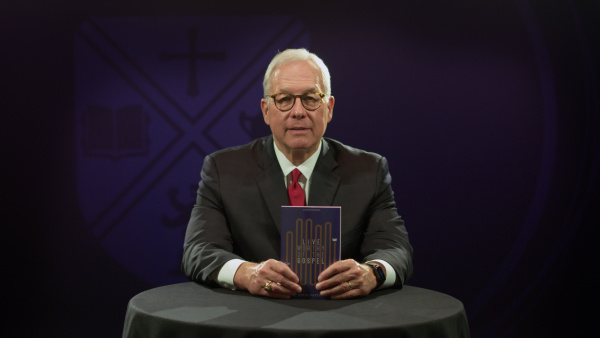We began our study with an overview of the book of Philippians. Let’s conclude it by reviewing the overarching truth of 1:27–2:18. Like a flag that the soldiers carry out to raise and fly proudly atop their pole, this passage unfolds from a compact but potent command: “Only let your conversation be as it becometh the gospel of Christ” (1:27). This call to live worthy of the Gospel — or to live as citizens of heaven — orients us to the message of these 22 verses.
The Responsibilities of Heavenly Citizenship
All of us enjoy the privileges of citizenship. Some are blessed with the benefits of dual citizenship, which makes travel and options for residence much simpler. However, as the proverbial saying goes, with privilege comes responsibility. National governments have established laws for their citizens. And in most countries, there are cultural expectations inherent in being a citizen, such as respecting the flag and affirming the pledge. As diverse as the United States of America is, the national anthem is still played or sung at the beginning of many major events. Professional athletes, who often seem solely bent on individual glory, band together to represent their country at the Olympics. They accept the responsibility of a citizen to proudly display their country’s colors in competition.
Paul makes use of this metaphor in his letter to the Philippians. They enjoyed certain rights as citizens of a Roman colony. But their most important citizenship had nothing to do with Rome or property ownership or anthems and flags. He emphatically states, “Our conversation (i.e., citizenship) is in heaven,” because that is where the Savior reigns (3:20). Since this is the case, it was imperative that they behaved like heavenly citizens, living in a way that displayed the worth of the Gospel (1:27). This is our duty as well.
The exhortation to walk worthy of our heavenly citizenship is parallel to what Paul says in Ephesians 4:1: “I therefore, the prisoner of the Lord, beseech you that ye walk worthy of the vocation wherewith ye are called.” We cannot do enough good to merit heaven. Living worthy of the Gospel does not mean earning the grace of the Gospel. But just as there are responsibilities of being a citizen of Singapore or another country, there are also responsibilities of being a citizen of heaven — living for the sake of the Gospel, giving our ultimate loyalty to the Lord Jesus Christ, and learning to “observe all things whatsoever (Christ has) commanded you” (Matt. 28:20).
The Pathway of Heavenly Citizenship
In 19th-century America, laborers worked feverishly to lay railroad tracks across huge stretches of undeveloped territory. One track necessarily led to the next. In our passage of study, Paul has likewise laid down a succession of truths to help us understand what living worthy of the Gospel looks like. Each piece of truth Paul presents is important in and of itself. But it also inevitably leads to another truth or responsibility.
Striving Together for the Gospel’s Sake
The passage begins with a command to exercise our heavenly citizenship by courageously proclaiming the Gospel in spite of persecution. Being a citizen of heaven does not mean standing still but standing strong. In order to “(strive) together for the faith of the gospel” we must maintain unity in that Gospel, as indicated by phrases such as “one spirit” and “one mind” (1:27; 2:2). This pursuit of unity is not based simply on being nice or on reducing the faith to the lowest common denominator so that everyone is satisfied. There are blessings we enjoy together in the Spirit that provide the motivation and ability to live in unity for the Gospel’s sake (2:1). And the heart of this unity is “having the same love” for Christ and one another (2:2).
Pursuing Unity Through Humility
Unity is of utmost importance because the mission God has given the church to make disciples of all nations is severely impeded when we prioritize by our own desires and agendas. Therefore, Paul next emphasizes that spiritual unity requires a spirit of humility. Like-mindedness is low-mindedness. Living worthy of the Gospel is not insisting on our own way or pursuing our own ambitions but placing the value of others ahead of our own (2:3) and giving careful attention to others’ needs, not just our own (2:4).
Becoming Conformed to the Mindset of Christ
After exhorting us to pursue unity through humility, Paul provides the most powerful pattern imaginable in the self-chosen humiliation of Christ Jesus. Gospel-worthy humility is impossible unless we meditate on Christ and are conformed to His mindset (2:5).
He set aside the privileges of deity and came to earth “in the likeness of men,” willingly giving rather than grasping (2:6). He retained “the form of God” but added to it “the form of a servant” (2:7). The final aspect of this exemplary mindset is the Son’s humble obedience to the Father’s will, which led Christ all the way down to the cross (2:8). Although the exact actions of Christ’s humility are for us as sinners unrepeatable and unreachable, His humble mindset lies at the heart of the image into which God is conforming His people (Rom. 8:29).
Understanding the Path to Exaltation
Paul’s portrayal of Christ does not end on a low note. Because Christ selflessly chose to lower Himself, His Father gladly chose to exalt Him (2:9). There is no longer any mistaking the identity and position of Jesus Christ. He has the greatest name possible. He is the Lord, and one day all of creation will humbly acknowledge this (2:10–11). Christ’s incarnate life is the supreme testimony to God’s consistent practice of exalting the humble. We can have confidence that God will honor our self-emptying humility. Jesus became what we are so that we might become conformed to what He is. The result of both is exaltation.
Persevering by the Grace of God
The sacrificial life and universal lordship of Jesus Christ provide compelling motivation to persevere in living worthy of the Gospel. After illustrating the humble path to glory, Paul explains the two sides of spiritual growth. Living worthy of the Gospel in the likeness of Christ entails both human responsibility and divine enablement. God has promised to complete in us His sanctifying work (1:6). The result is certain. But He has also ordained our faith-filled obedience to His Word as the means by which we progressively grow in sanctification. Consequently, Paul weaves together a command to “work out our salvation” (2:12) with an assurance that God is right now giving us the desire and ability to do so (2:13).
Shining as Lights in the World
The passage then moves from a general exhortation to persevere by God’s grace to a specific imperative not to complain and argue (2:14). Disunity was one of the problems in the Philippian church and, therefore, receives Paul’s special focus in knowing what it means to live worthy of the Gospel. In this section, we learn that the significance of our obedience goes well beyond our personal lives and even our relationships with other believers. Holiness and love within the church brightly beam the Gospel to the lost world around the church (2:15). By maintaining an eternal perspective, we have more than enough motivation to tightly grasp the Gospel and see God spread its life-giving power (2:16).
Finding Joy Through Sacrifice
Paul concludes this passage by affirming his joy and commending it to his readers. The pathway to spiritual maturity requires sacrifice for all of us, not just apostles. But there is joy in laying everything on the altar for the sake of the Gospel (2:17). The Philippians had demonstrated remarkable commitment to Paul and his gospel ministry. He wanted them to continue with the confidence that no amount of adversity can quench the joy that arises through gospel-focused living (2:18).
The Essence of Heavenly Citizenship
One final aspect of Paul’s letter merits attention as we complete this study. Though this epistle is more autobiographical than most of Paul’s inspired correspondence, the apostle himself is not the central figure. Sterling examples like Timothy and Epaphroditus are important but secondary as well. And though Paul wrote to the Philippians with their current circumstances clearly in view, their lives are not the main point of the letter either. As 21st-century readers, we need to apply this divinely inspired teaching personally and collectively. But we cannot do so by focusing on ourselves.
The most important person in Philippians is Jesus Christ. Paul captures this reality in one potent declaration, “To live is Christ” (1:21). We live worthy of the Gospel by focusing on Him. The centrality of Christ permeates this letter in numerous ways. For example, Paul uses phrases such as “in Christ” and “in the Lord” nearly 20 times. The second coming of Christ serves as a primary motivation in several passages (1:6, 10; 2:10–11, 16; 3:20–21). More than anything else, Paul wanted to know Christ (3:10). He had lived a highly respectable religious life before his conversion. If anyone had reason to glory in his status and accomplishments, it was Paul. However, he not only left all this behind but considered it waste in comparison to being “found in (Christ)” (3:9).
In the economy of heaven, which is the one that really matters, to gain Christ is to gain everything (3:8). Our Savior is the essence of heavenly citizenship.
Conclusion
We have had the privilege of studying a rich portion of Scripture that in many ways captures the essence of the Christian life. It’s a stretch of “spiritual railroad” that we need to review often. And we can do so with the guarantee that God is energizing even the feeblest of faith-filled efforts to live worthy of the Gospel. With minds fixed on Jesus Christ, we can follow the example of Paul in spiritually mature living that is full of joy.
This post is from Live Worthy of the Gospel: A Study in Philippians by Steve Pettit. Copyright 2016 by BJU Press. Printed by permission of BJU Press.
This post is part of the study designed to correspond with the 2020 Fall Chapel Series.
Join us for chapel via live webcast at 11 a.m. every Monday and Wednesday.








